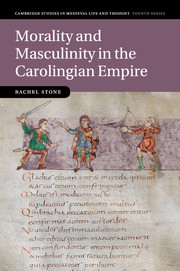Book contents
- Frontmatter
- Contents
- Illustrations
- Acknowledgements
- A note on translation
- Abbreviations
- The Carolingian empire
- Genealogy of Carolingian rulers
- Chapter 1 Introduction
- Chapter 2 Moral texts and lay audiences
- Chapter 3 Warfare
- Chapter 4 Imagining power
- Chapter 5 Central power
- Chapter 6 Personal power
- Chapter 7 Power and wealth
- Chapter 8 Marriage
- Chapter 9 Sex
- Chapter 10 Men and morality
- Bibliography
- Index
Chapter 5 - Central power
Published online by Cambridge University Press: 05 November 2011
- Frontmatter
- Contents
- Illustrations
- Acknowledgements
- A note on translation
- Abbreviations
- The Carolingian empire
- Genealogy of Carolingian rulers
- Chapter 1 Introduction
- Chapter 2 Moral texts and lay audiences
- Chapter 3 Warfare
- Chapter 4 Imagining power
- Chapter 5 Central power
- Chapter 6 Personal power
- Chapter 7 Power and wealth
- Chapter 8 Marriage
- Chapter 9 Sex
- Chapter 10 Men and morality
- Bibliography
- Index
Summary
As in most western societies until recently, in the Carolingian period there was a close link between the ruler, the ‘state’ apparatus and the nobility. A variety of secular office-holders are visible in Carolingian sources, sometimes with overlapping roles. For example, Louis the Pious’ Legationis capitulum from around 826 mentions missi, comites, advocati, vicedomini, vicarii, centenarii and scabini. The highest secular offices were effectively reserved for noblemen, unlike some other medieval societies.
Closeness to the ruler and attendance at court were thus key sources of noble power. Lupus of Ferrières told Charles the Bald in around 843: ‘do not fear the potentes, whom you made yourself and whom you can bring low when you wish’. This was undoubtedly an exaggeration, but royal favour was essential for real prominence and there was keen competition for it. The rewards included not only office, but also more tangible gains: Charlemagne’s courtiers shared in the booty after the defeat of the Avars, for example. Einhard’s letters show the variety of royal favours that a prominent courtier might seek both for himself and his friends, including exemption from paying the heribannus (a fine for not attending the host when summoned), grants of benefices and their retention in times of political turmoil. In return, such courtiers had a duty to give ‘aid and counsel’ to the ruler.
- Type
- Chapter
- Information
- Morality and Masculinity in the Carolingian Empire , pp. 135 - 173Publisher: Cambridge University PressPrint publication year: 2011

